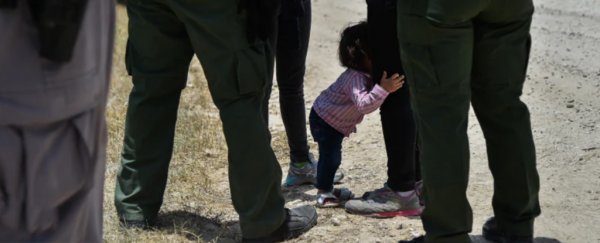Long after the wailing and tears, the trauma of separation can linger in children's minds, even after they are reunited with their parents, experts say.
On Wednesday, under pressure from around the globe and his own party, President Trump signed an executive order to keep migrant families together. For some, the crisis may now seem resolved.
But experts warn that for many of those children, the psychological damage of their separation will require treatment by mental health professionals - services they are extremely unlikely to receive because of US government policies for undocumented migrants.
"It's not like an auto body shop where you fix the dent and everything looks like new. We're talking about children's minds," said Luis H. Zayas, professor of social work and psychiatry at the University of Texas at Austin.
"Our government should be paying for this. We did the harm; we should be responsible for fixing the damage. But the sad thing for most of these kids is this trauma is likely to go untreated."
Children who have undergone traumatic separation often cling desperately to their parents after they are reunited and refuse to let them out of their sight, say therapists and child psychologists.
Many suffer from separation anxiety, cry uncontrollably and have trouble sleeping because of recurring nightmares.
Others develop eating disorders, problems with trust and unresolved anger, in some cases against their parents.
"You see some children even strike out at the parents. They don't always understand why their parents abandoned them and sometimes blame them. So they have difficulty reattaching," Zayas said.
Louis Kraus, a child psychiatrist at Rush University Medical Center, said the separation of migrant children from their families could have severe effects.
(Patrick Martin/Photo: Salwan Georges/The Washington Post)
Zayas recalled one 8-year-old girl he counseled after authorities removed her and her undocumented parents from their home and separated them for several days as her parents awaited charges.
Even two years after the incident - after the girl was reunited with her parents as the family awaited court hearings to cancel the deportation - Zayas said: "She couldn't let go of them, ever. She had nightmares and would get fearful whenever she saw any police vehicles. She lived in extreme fear that her parents would do something wrong and be taken away again. It stayed inside of her."
Left untreated, such trauma can lead to deeper problems like post-traumatic stress disorder, substance abuse, alcoholism and even suicidal behavior, said Jodi Berger Cardoso, an assistant professor at the University of Houston who studies the effects of trauma on immigrants.
Children intercepted at the border are often especially vulnerable to developing PTSD and other disorders because their families are fleeing violence and catastrophe.
Cardoso and others say they worry about what happens to the children once they are reunited with their parents.
Some may be reunited but remain in detention centers with their families. Studies show long-term detention can have damaging effects on children, which is why some rules exist limiting how long authorities can keep children in detention.
Studies have shown that boys held in detention, even for short periods of time, such as two or three weeks, can develop anti-social behavior, violence and substance abuse problems.
Teenage girls more often show depressive disorders and substance abuse.
And those being deported back to certain countries - such as Honduras, El Salvador and Guatemala, which have among the world's highest murder rates for children and adolescents - will face many of the same dangers and traumas that they were fleeing.
Other psychologists and child advocates point out that while Trump's order stops the recent child-parent separations at the border, it doesn't address immigration policies that are causing children to be separated from parents on a larger scale.
In 2015, for example, the Department of Homeland Security deported more than 12,000 immigrant parents with US citizen children - causing many of those families to split.
"The outrage that people have been facing the past few days, I wish people would keep in their minds that this is continuing to happen in our country every day," Cardoso said.
"What we've all been focused on at the border, it's just a microcosm of the trauma that is happening and will continuing to happen."
2018 © The Washington Post
This article was originally published by The Washington Post.
